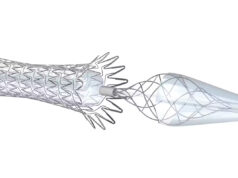
A retrospective, nationwide cohort study has revealed carotid endarterectomy (CEA) performed better than carotid artery stenting (CAS) in France over the course of a decade, while also highlighting the “overuse” of both procedures in the same period. Based on their findings, the research team calls for the suspension of interventions for carotid artery disease until appropriate studies are conducted.
The investigation—which authors Eric Steinmetz (CHU Dijon Bourgogne, Dijon, France) and colleagues note involved the largest cohort of asymptomatic carotid procedures ever studied—was recently published as an Editor’s Choice paper in the European Journal of Vascular and Endovascular Surgery (EJVES).
Steinmetz et al begin by stating that it was their objective to compare peri-procedural stroke or death within 30 days of a procedure in patients who underwent either CEA or CAS.
The researchers used data from the PMSI (Plan de financement à l’acte) hospital database, including in their study all patients who underwent either CEA or CAS between 2010 and 2019 in France.
Steinmetz and colleagues share that, between 2010 and 2019, 164,248 patients underwent a carotid artery procedure in France, comprising 156,561 CEA and 7,687 CAS procedures. They note that asymptomatic women made up around 25% of the total cohort and high-risk patients, 40%.
The authors report in EJVES that the rate of peri-procedural stroke or death within 30 days was 1.5% overall, 1.3% in asymptomatic patients, and 3.3% in symptomatic patients. They detail that, after matching and adjustment, the risk of peri-procedural stroke or death within 30 days was statistically significantly greater in patients who underwent CAS than in patients who underwent CEA.
In their conclusion, Steinmetz et al stress that many patients in the study—specifically asymptomatic women, high-surgical-risk patients, and patients undergoing CAS—received procedures that were more likely to be harmful than beneficial, according to the results of past randomised trials.
In addition, the authors write that “despite the huge number of asymptomatic carotids treated in the present sample, there is currently no proven benefit for asymptomatic carotid intervention compared with best medical treatment alone, or for screening for carotid artery disease”.
Based on these conclusions, Steinmetz and colleagues propose there “should be a moratorium on procedures for carotid artery disease until appropriate studies are conducted to determine whether [these procedures are] beneficial and for whom,” adding that studies are warranted to assess whether screening to detect carotid stenosis improves outcomes compared with non-invasive care directed only by clinical risk factors and without arterial imaging.
Furthermore, Steinmetz et al highlight a “tremendous overuse” of carotid procedures and an “urgent need to reconsider guidelines that encourage carotid artery procedures when there is no evidence of procedural benefit, and concurrent ongoing proof of procedural harm and significant cost”.













It is amusing, in a discouraging sort of way, to see how little the data have changed since my vascular surgery fellowship in 1978-79. Of course this study, or at least this synopsis, doesn’t break down the asymptomatic cases by degree of stenosis or extent of bilateral disease. Asymptomatic, hemodynamically-insignificant 40% stenosis is a different animal from asymptomatic 95% flow-reducing stenosis. But still, except for a few thankfully debunked nihilistic studies by academic neurologists years ago, the published perioperative stroke rates for carotid artery revasularization remains just over 1%. It can be lower still in the hands of properly-trained, experienced surgeons away from academic institutions. And it was always intuitively obvious that expertly-done open CEA provides better assurance of distal control, and hence less risk of embolization, than any endovascular procedure, however elegant the catheters. I’m retired, so it’s no longer my fight, but it’s satisfying not to have to change my decades-long opinion.
Now are they including TCAR in this as well as carotid artery stenting